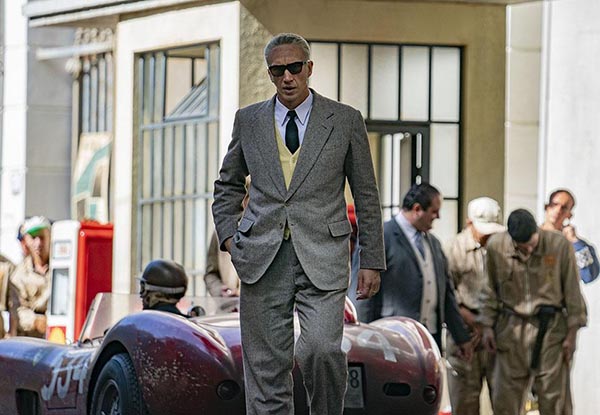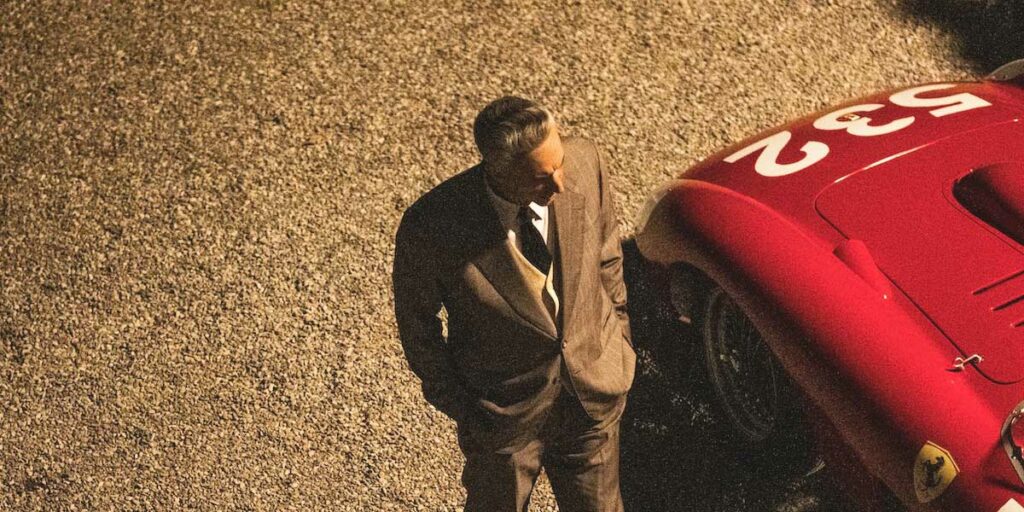Michael Mann’s Ferrari looks and sounds exquisite, but speed bumps come in the form of uneven performances and tonally off moments.
Michael Mann’s Ferrari equates racing with beauty and religion, as does its protagonist. While the film relishes in building tension in the lead up to the fateful Mille Miglia race of 1957, the roar of racing engines fuels the personal life of Enzo Ferrari (Adam Driver, of White Noise) as much as his professional endeavours. It’s a film that explores a very specific period in the life of Ferrari, particularly focusing on the overlap between business and man. It feels a little exposition heavy at times, even somewhat laboured as it hurtles towards inevitable tragedy, but a charismatic Driver and overall compelling narrative pull it along well enough.
Enzo Ferrari (Driver) has a lot of plates to juggle. He is navigating the blood-thirsty press, increasing market competition, the integration of Alfonso De Portago (Gabriel Leone) to his racing team, grief for his son, a secret but stable life with his mistress Lina (Shailene Woodley), and trying to stem the powder keg that is his wife Laura (Penélope Cruz, of High and Low – John Galliano) as their company faces going broke. Add in the fact that the infamous Mille Miglia race is fast approaching, with the future of Ferrari at stake no less, it is quite the period of emotional upheaval for the man.
With Ferrari, Mann and writer Tony Kennedy Martin have stayed within the realms of a traditional biopic, relatively speaking, without slavishly depicting every aspect of Enzo’s life and career. It is placed very specifically within the confines of the late 1950s as a metaphor for a period of change, both professionally and personally for Enzo, and eschews a lot of the traditional trappings in favour of starting essentially in media res. As such, it does have a tendency to lean quite heavily on exposition, but all its component parts are engaging enough that it isn’t necessarily to the film’s detriment.

Ferrari is the heart of the entire film, with the man and the business entwining to essentially become one and the same. And it feels as though that sentiment is exactly what Mann intended. Driver’s Enzo is equal parts ruthless and compassionate, ambitious but realistic, business savvy whilst also incredibly driven to succeed at a dream, in both his personal and professional lives. It’s a really layered performance, emphasised in parts by Mann’s tendency to offer – sometimes unnecessary – close-ups of Driver’s face as he navigates through an emotion, but Driver really sells it. He feels like a grounding presence, a pillar of stability around which the events of the film unfold, and it anchors the story in a manner that emphasises Driver’s inherent ability to captivate audiences.
But in a sea of impressive supporting roles that includes the likes of Patrick Dempsey and Jack O’Connell, there is one that almost outshines him completely: Penélope Cruz. She is absolutely terrific as Laura. While at first Ferrari seems destined to have her contribute only dramatics, it does eventually provide her with a bit more agency, even if it does all centre around the archetype of being a scorned wife. Wrecked by grief, fuelled by anger at the evidence of Enzo’s continued infidelity, and unabashedly weary of a life determined by the mechanics of a car, Cruz deftly handles the emotional turbulence with impressive ease. Towards the end of the film there is a scene in which she and Enzo confront each other, and it is perhaps Ferrari’s stand out moment, as it shows not only the pair’s compatibility as business partners, but their comfortability as husband and wife. And Cruz is electric on screen the entire time.
The same, unfortunately, cannot be said for Shailene Woodley, who is drastically underserved here. Her characterisation is paltry at best, and Woodley doesn’t particularly elevate the material in a manner that’s particularly memorable or conducive to understanding what has captured Enzo’s attention for so long. It’s a shame because the chemistry between her and Driver is evident, but Lina simply falls a little bit flat in the shadow of Enzo, Laura and that distinctive yellow badge.
From the very first second of the film, Ferrari consistently emphasises the dangers of motor racing. The events of Mille Miglia are both heavily foreshadowed and historically accurate, but Mann does an excellent job of creating and building tension. The sequences in which cars eke past each other on hairpin corners, with Daniel Pemberton’s score and the sound design of Andy Nelson and Tony Lamberti all but shattering the speakers, are heart-in-mouth stuff. The inevitable crash elicited audible gasps from the audience, and as a moment of tension relief it works powerfully.
Unfortunately, the immediate macabre aftermath and unnecessarily lingering shots of casualties – both human and machine – feels slightly distasteful. It’s jarring and almost out of place in a film that has so far been much more concerned with the integration of Ferrari and the beautiful, picturesque splendour of the Italian countryside. It’s perhaps the film’s only completely bum note, because the crash itself gets the reaction it feels like Mann wanted, and so the gratuitous gore doesn’t add anything at all to the emotional impact of that scene. It’s even more frustrating when compared to an earlier one at the opera, which is exquisitely judged emotionally, because it cheapens the moment Ferrari has been careening towards the entire time.
Mann’s Ferrari looks beautiful, even if it does have some bumps in the road, and is anchored by two very impressive performances. Cinematographer Erik Messerschmidt does an excellent job of showcasing the beauty of Modena and the rolling green hills surrounding it – and whether that’s improved or spoiled by the flashy red cars is entirely dependent on your point of view – and it truly feels lush. It’s an enjoyable time capsule from Ferrari’s life, both man and machine, with a few imperfections in the form of tonally wrong moments and some uneven performances. It’s a well oiled enough competitor, but maybe not the pinnacle of speed it could be.
Ferrari premiered at the 2023 Venice Film Festival on August 31, 2023 and will be released in US theaters on December 25 and in UK cinemas on December 26. Read our review of Michael Mann’s Heat.

